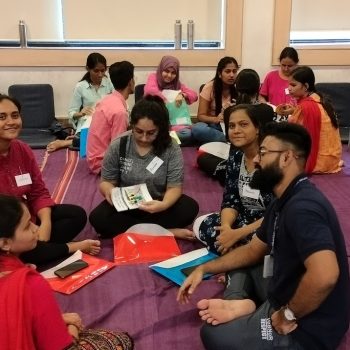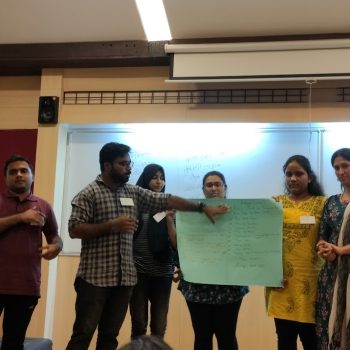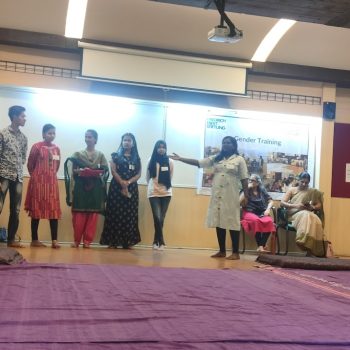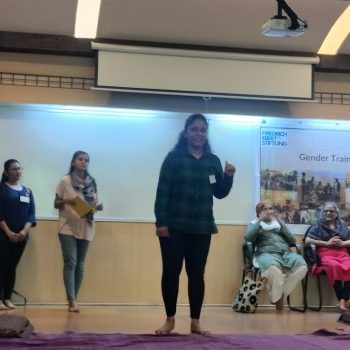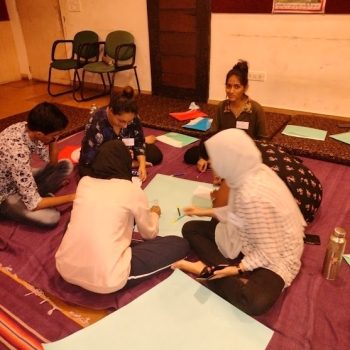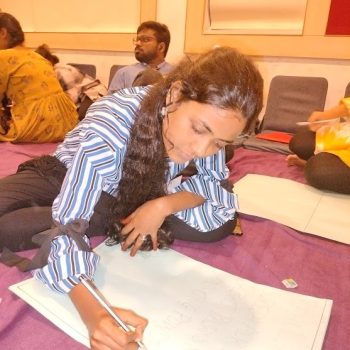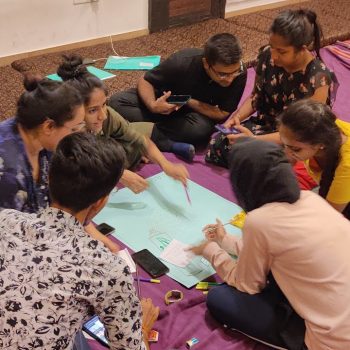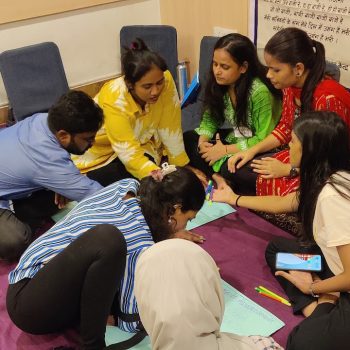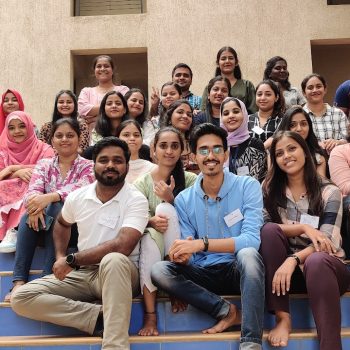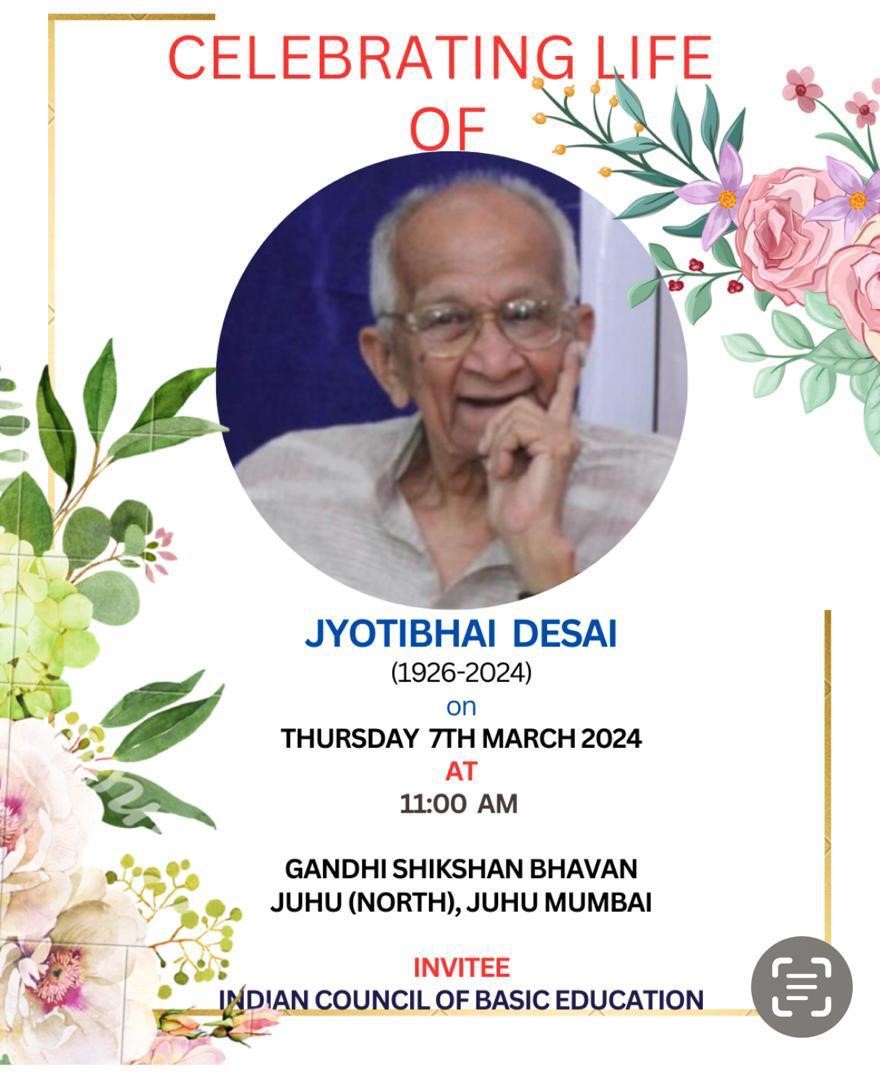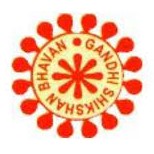
Vacha Training Session | 23-25 Aug 2022
Report-1 Vacha training session – 23rd Aug 2022
Name: Priyanka Yadav
Roll no. 49
Part 1
Date of paper reading: 26/8/22
On 23rd, August 2022 VACHA team organized a three day camp at Yuva center ,kharghar . The three days camp was attended by almost 35 participants including facillitator.
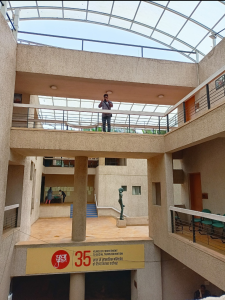 We all reached Yuva center around 8.30 am and completed the registration procedure.we got batch and folders which included books and pen.Then we proceeded to canteen for breakfast .Then we started with our actual part of training programme. First of all Yagna ma’am introduced about Vacha and Friedrich Ebert Stiftung (FES). Then our host for the day one, Rupali ma’am organized a very interesting game to form groups . Then we were asks to share the information of our parents and quality. Then our partner introduced us and we introduced our partner.
We all reached Yuva center around 8.30 am and completed the registration procedure.we got batch and folders which included books and pen.Then we proceeded to canteen for breakfast .Then we started with our actual part of training programme. First of all Yagna ma’am introduced about Vacha and Friedrich Ebert Stiftung (FES). Then our host for the day one, Rupali ma’am organized a very interesting game to form groups . Then we were asks to share the information of our parents and quality. Then our partner introduced us and we introduced our partner.
Then Rupali ma’am started the session of sociogram. Where we were asked about the names of our grandparents and relatives. the outcome was many of us were knowing the name of our father side grandparents and relatives but most of us were unaware of our mother side grandparents and relatives. Then we were asked about our participation in social activities. Then we went for tea break.
After the break we met with Chayanika ma’am who give information all about term gender and sex. Majorly she talked about intersex . And after the session we realised that other than socially decided roles and biological organs it’s the own individual who decides about their gender. So it’s self determinant.
Then we went for lunch break.
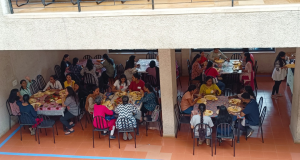 Then Yagna ma’am gave us a activity where we had to prepare the budget of a family so that their expenses match with their income. So we again got divided in groups. And started preparing new budget. While preparing budget we all gave options to husband who was alcoholic, less working and less earning guy. Many of us tried to cut down the expenses of their basic foods like milk, and meat but very few of us totally eradicated the drink expense of husband. So this shown that inspite of calling ourselves modern we all are still not got ourselves out of patriarchal thinking.
Then Yagna ma’am gave us a activity where we had to prepare the budget of a family so that their expenses match with their income. So we again got divided in groups. And started preparing new budget. While preparing budget we all gave options to husband who was alcoholic, less working and less earning guy. Many of us tried to cut down the expenses of their basic foods like milk, and meat but very few of us totally eradicated the drink expense of husband. So this shown that inspite of calling ourselves modern we all are still not got ourselves out of patriarchal thinking.
Then again we moved to tea break.
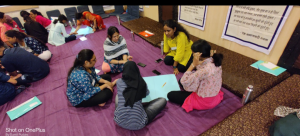 After tea break we had movie screening of name “ek chingari ki khoj me”. In the movie we had seen the story of two friends Shanti and Usha. Shanti was married and pregnant working women. Whereas Usha was about to marry. One day during lunch Usha noticed that Shanti was eating very less food and that too a raw papaya. Then Usha offered Shanti her lunch box and Shanti ate food like she was hungry for days, after the work Usha while talking with her mother she discussed about the friends incident and from his mother she came to know that raw papaya is very unhealthy for pregnant women. The next day she asked her friend Shanti about everything so Shaanti described how her husband is denying the fact of being father of her child. And how her in laws and husband was beating her. Inspite of facing all these physical and mental torture she can’t go to her mother because Shanti has one younger sister to marry and she can’t become burden on her mother. Then her friend Usha suggests to file police complaint still she denies doing so. Then one day husband of Shanti kicks on her womb and her baby dies inside the womb she gets admitted in hospital police inspectors asks how it happened she tells lie that she fallen from stairs which is false. She saves her husband and one day her husband comes to take her back to home she just asks one promise that he’ll not beat her and he says yes and both go. After seeing this Usha 1st tests her future husband and founds that her future husband is only nice with her because Usha has job and she is earning good So he just wants her salary. one day he asks for the some financial help and mother of Usha gives the salary of her daughter to future in law. After observing all this Usha took the decision to break relation with her fiancee.
After tea break we had movie screening of name “ek chingari ki khoj me”. In the movie we had seen the story of two friends Shanti and Usha. Shanti was married and pregnant working women. Whereas Usha was about to marry. One day during lunch Usha noticed that Shanti was eating very less food and that too a raw papaya. Then Usha offered Shanti her lunch box and Shanti ate food like she was hungry for days, after the work Usha while talking with her mother she discussed about the friends incident and from his mother she came to know that raw papaya is very unhealthy for pregnant women. The next day she asked her friend Shanti about everything so Shaanti described how her husband is denying the fact of being father of her child. And how her in laws and husband was beating her. Inspite of facing all these physical and mental torture she can’t go to her mother because Shanti has one younger sister to marry and she can’t become burden on her mother. Then her friend Usha suggests to file police complaint still she denies doing so. Then one day husband of Shanti kicks on her womb and her baby dies inside the womb she gets admitted in hospital police inspectors asks how it happened she tells lie that she fallen from stairs which is false. She saves her husband and one day her husband comes to take her back to home she just asks one promise that he’ll not beat her and he says yes and both go. After seeing this Usha 1st tests her future husband and founds that her future husband is only nice with her because Usha has job and she is earning good So he just wants her salary. one day he asks for the some financial help and mother of Usha gives the salary of her daughter to future in law. After observing all this Usha took the decision to break relation with her fiancee.
Then sharanya ma’am made a 5 groups and each group gave different topic and says each have to present a role play on this.
And in this way our session day was over .We all started preparing on that. At 9 a clock had a dinner.
On next day 24th August we all woke early because the breakfast timing was 8.30.
There was Poha in breakfast we enjoyed it.
From 9.30 again our session was started .At the starting sharanya ma’am took recapitulate of all those things whatever we did and learn yesterday one by one all of us said something And discussed. After recapitulation of all things we sung a song ” khat pe likho” then started to present our role play and had a discussion .Then Daiwashala ma’am started the topic which was Patriarchy.
Ma’am explained us how Patriarchy works in our society.
In this way our this session over then we went for a lunch .
Report-2 Vacha training session – 25th Aug 2022
Antara Parashar
Roll no: 30
From the 23rd to the 25th of August, 2022, F.Y.B Ed students of Gandhi Skhikshan Bhavan attended a residential training conducted by Vacha- in the Yuva center at Kharghar. During this period, a variety of topics were introduced regarding gender and the structures prevalent within our society.
On the 24th, post lunch we had a session on “Intersectionality and Power walk” conducted by Mr. Pravin Thote. After an ice breaker, the session began with a demo, followed by an activity called the Columbian Hypnosis. It required the participants to work in pairs to lead one another through a space as one participant followed another participant’s hand. The partner with the power would move their hands and the other partner’s face had to follow keeping 1 feet distance. After one round of this, the power to guide the other was exchanged. In the third round, both partners would guide the other and also follow the other’s hand. After this, we discussed our experiences during the activity. It was seen how when one was in power, there was a mix of feelings where they believed they could get the other to do anything. Some had fun guiding their partners however they wanted, others were concerned for their follower’s safety. In the second round, when the follower became the one who had the power to guide, again the experiences were mixed. While some wanted to give their partners a taste of their own medicine, the others were more empathetic to the plight of the followers. The third round was the most complicated one to execute and participants through more practice intuitively figured out the balance between dominating and following. Mr. Pravin then went on to elaborate more on the concept of power; the different ways that one can get more power in this society, like education, money, caste, color, language etc. We also discussed the different types of exerting this power, whether it is with a weapon like a stick or a gun, or through monitoring via cameras.
This discussion was followed by our next activity: Power Walk. Participants were made to stand in a straight line facing forwards. They were each given a role. Situations were put forth such as “Can you get a loan worth 10 lakhs?” or “Can you go outside to meet your friends whenever you want?”. If the participant’s roles could do these things, then they would take a step forward, If not, then they would take a step backwards. If they were unsure, they would stay in their places. All participants started at the same starting point, but by the end when all questions were asked, everyone’s positions had drastically changed. Some were way ahead, some were very far back, and some remained in the middle. When the activity was broken down, it was seen that roles that were given were complex and ranged from “19 year old dalit women who cannot see” to “A 45 year old man with 10 acres of land belonging to an upper caste”. Each role given had certain aspects in their description that gave them power such as being educated, belonging to the upper caste or being a man. Each of the roles also had something that reduced their power such as being a dalit, being a women or having a disability. Mr. Pravin further explained how each individual belongs to a multitude of groups (or sections) in society and each of these sections interplay with each other and guide how far we go in life. Through the power walk the participants literally wore the shoes of another person and faced a myriad of situations with all its advantages and discriminations and hence understood the concept of intersectionality.
At 6:30 in the evening, after a short tea break, there was a screening for the movie “Gaon Nahin Kinni Paanch Ka”. The story is set in a village setting, where due to government policies, a female needs to hold the position of Sarpanch. Unfortunately the elected sarpanch only holds nominal power here and the real power is held by her elder brother. The elder brother and four other members of the panchayat misuse their powers to benefit themselves at the cost of the village’s welfare. When the village faces the consequences of the poor management by the panchayat Kaanta bai, a female dalit representative in the panchayat encourges Sharda, to take her true power as sarpanch in deed and not in name only. Inspired by this, the sarpanch starts working for the prosperity of her village and overcomes various obstacles. The screening was followed by discussion where participants reflected on the movie by bringing back the learnings learned earlier in the day on patriarchy and intersectionality.
The day ended with an assignment on poster making. Four groups would showcase ads on two topics, i) An advertisement for marriage, ii) An advertisement of a product (options were: detergent, car, property and deodorant)
The following day- post breakfast- began with a song and a recap of previous days’ learnings. The first session of the day was “Gender in Text”. The posters made the previous evening were displayed and groups turn by turn explained their thought process for everyone. The session’s in-charge, Ms. Steffi gave her feedback for them. After that, participants were divided into new groups and were given texts which had to be analyzed with the lens of gender, patriarchy and intersectionality. Groups came forward turn by turn where they summarized the story and highlighted the issues within the text. The session concluded with Ms. Steffi emphasizing on the power of language- where language is one of the many tools that we use to discriminate between social groups; and that we must be sensitive to the words we use in our daily life.
The last session was taken by Mrs. Nishchint who conducted a quiz on “Women in all walks of life”. The quiz covered women in politics, social work, literature, movies etc.
The three day training concluded with a feedback form and distribution of certificates. In those three days every participant had an eye opening experience in a comprehensive list of topics. It changed the perspective and created awareness about many things. Everyone left the training feeling more conscious and critically aware of their own society. It will hopefully impact the way one interacts with members of all social groups, the generalizations one makes about others and help one be a more mindful teacher in the future.

